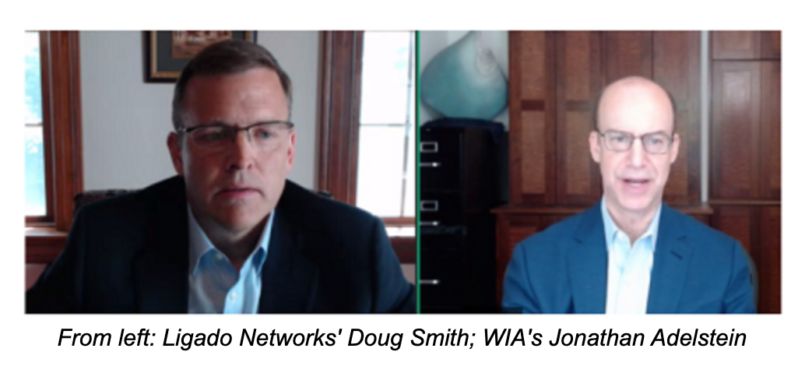“We want to bring purpose-built private networks” for businesses into the 5G arena. That’s according to Ligado Networks President/CEO Doug Smith.
He spoke with Wireless Infrastructure Association President/CEO Jonathan Adelstein on a webinar yesterday about investing in U.S. infrastructure. Smith said focusing on private networks differs from what other carriers plan to do.
“From a terrestrial network standpoint, we’re just getting started. We’re going to dedicate spectrum to a customer. We can build it and put it on our network,” said Smith. Those aspects bring a higher level of security to a network, he asserted, noting that fewer people using a network, plus limiting who has access to that network brings a higher level of security.
Adelstein asked how 5G networks could benefit the enterprise sector. Smith used railroads as an example. “There’s a lot of rail track. As you bring 5G services, you can improve efficiency and safety,” Smith noted.
He stressed the need for cell towers to make 5G work. “As more infrastructure is being built, we need access to cell towers. We need backhaul, we need power,” he explained. “The infrastructure has to lead development.”
Speaking about the $65 billion being discussed on Capitol Hill for the President’s infrastructure package, Smith called the numbers “a big shot in the arm to get infrastructure out there.” His company will be building in new, unserved markets as well as existing markets. “From a tower standpoint, you’ll see additional lease-ups,” he noted.
Smith clarified that private networks, “doesn’t mean exclusive use of new towers. Like carriers, we will look to share. The private aspect is who controls the network.” Ligado has spectrum in the 1 gigahertz band.
Ligado, formerly Lightsquared, received FCC approval for its network plans last year, over the objections of several federal agencies, especially defense-related bodies. The argument against allowing Ligado to proceed with its network on L-band is the potential for harmful interference with GPS, Inside Towers reported.
The Commission said in its decision that Ligado must correct any interference, and pay for mitigation to an incumbent L-band licensee. But opponents, such as the Department of Defense, say complaining after the fact is impractical, and dangerous, if GPS-guided weapons don’t work.
Concerning the controversy that continues, Smith said Ligado’s system underwent a year of testing until FCC engineers were satisfied. “It’s unfortunate that some continue to question the path. We need to have a process that comes to a conclusion.”
He noted there is still “some pushback and controversy” over that decision, and explained: “We’ve always taken a collaborative approach to make sure anything we do isn’t destructive. We’re not going to disrupt any services.”
By Leslie Stimson, Inside Towers Washington Bureau Chief





Reader Interactions